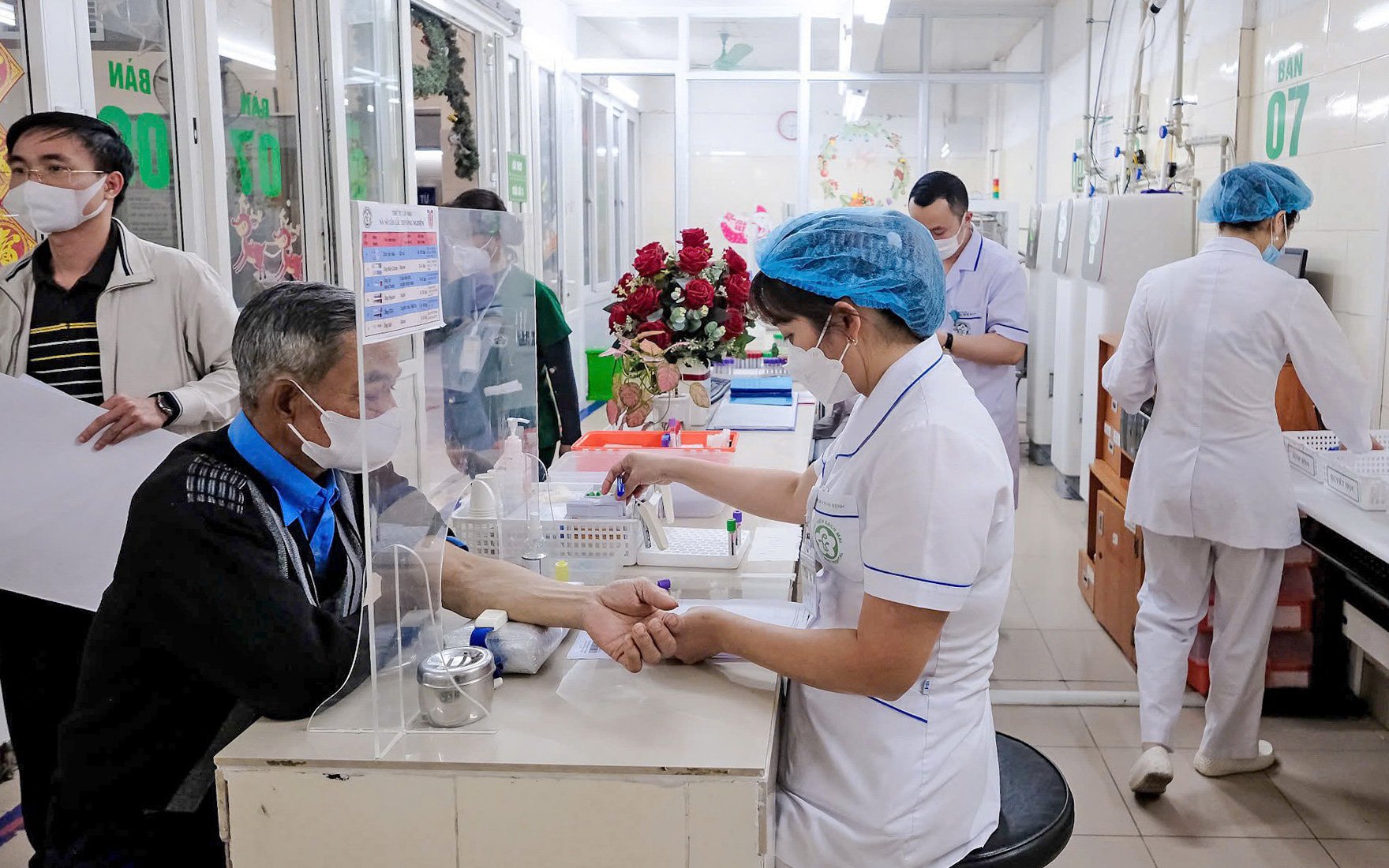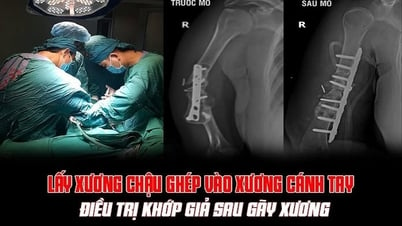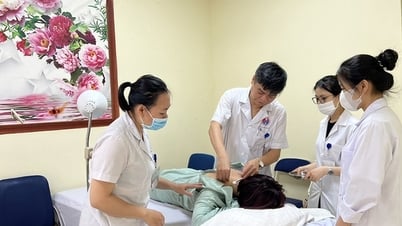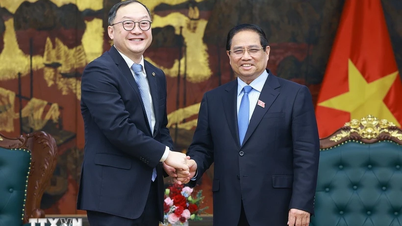To improve the quality of healthcare , human resources must be "synchronized". How will the medical industry focus on improving the quality of healthcare human resources in 2025?

Doctors and nurses working at a hospital - Photo: NAM TRAN
Solutions to improve the quality of medical staff, develop human resources, especially propose policies for students...
Comprehensive innovation in medical human resource training
Minister of Health Dao Hong Lan affirmed that the ministry is comprehensively reforming the training of human resources in the medical sector, training based on competency standards to ensure sufficient human resources in both quantity and quality.
In particular, the Ministry of Health has taken initial steps to innovate the training of medical human resources. Building and implementing training capacity standards, regulations on training of specific specialties. The network of medical human resources training facilities continues to develop both public and non-public, expanding training specialties.
The Ministry of Health has issued a decision approving the Project on developing human resources for the health sector for the period 2023 - 2030, with a vision to 2050, aiming to develop a sufficient number of human resources for the health sector, ensuring quality, professional competence and medical ethics. Thereby improving the capacity to care for and improve people's health, towards the goals of fairness, efficiency, development and international integration.
Need high quality human resources
Speaking to Tuoi Tre, Professor Nguyen Huu Tu - Principal of Hanoi Medical University - said: "The issue that needs great attention is the quality of medical human resources. With the new network planning, many hospitals will become specialized hospitals and hospitals that meet international standards.
Therefore, it is necessary to have high-quality human resources working at these hospitals, in addition to modern facilities and machinery.
High-quality human resources in the health sector do not form naturally but must start from the "root" of training at quality universities, then gradually improve.
To build a better health system, investment in improving the quality of university training is extremely important, urgent and should be a step ahead, especially for national key universities, the "main engine" of the training system. If the "main engine" training health human resources is not healthy, the success of the whole system cannot be guaranteed.
Currently, simultaneously expanding the scale of training and improving the quality of training is facing many difficulties when universities have to implement autonomy and regularly invest in facilities, while resources are limited.

Medical staff work hard, income is not high - Photo: NAM TRAN
Need synchronous investment
Sharing the same opinion with Professor Tu, Mr. Tran Van Thien, Deputy Director of Hanoi National University Hospital - Hanoi National University, also said that to improve the capacity of training human resources in the medical sector, there needs to be synchronous investment.
According to Mr. Thien, medical training is not only about treating diseases but also about "treating patients". The same disease but different patients will have different treatment methods. Therefore, in parallel with theoretical training, practice is very important for medical students.
"Currently, medical students' practice at schools still faces many difficulties and limitations. Many schools do not have enough practice facilities, and there is no effective coordination mechanism between training schools and hospitals, except for some schools with affiliated hospitals," said Mr. Thien.
Previously, at the end of 2023, the Ministry of Education and Training had a draft summary report on the planning of the network of higher education and pedagogical institutions for the 2021-2030 period, with a vision to 2050.
Among the 18 national key universities, according to the proposal of the Ministry of Education and Training, there are two schools in the health sector, including Hanoi Medical University and Ho Chi Minh City University of Medicine and Pharmacy.
Four schools are planned as regional universities, besides Thai Nguyen University, including Vinh University, Nha Trang University, Tay Nguyen University, and Can Tho University.
Proposing policies to support medical students like those in education
According to statistics from the Ministry of Health, in just 18 months (from January 1, 2021 to June 30, 2022), 9,680 health workers nationwide have resigned or quit their jobs. The Ministry of Health also pointed out four reasons why health workers resign or quit their jobs.
One is due to work pressure, work overload accompanied by high intensity work for long periods of time, without days off.
Second, due to low income and the attraction and treatment by private medical facilities are higher than public medical facilities.
Third, due to the pressure of lack of medical equipment and facilities to perform professional tasks. This has limited the development of professional qualifications and capacity of medical staff.
Fourth, it is due to pressure from society, family, relatives, and even pressure from patients and their families.
Recently, the Ministry of Health proposed that the Government pay attention to and issue policies and regimes to treat and attract human resources in the health sector. In particular, the Ministry proposed to study a number of policies to support medical students equivalent to those in the pedagogical sector.
In particular, the Ministry of Health recommends that the Government pay attention to directing and promulgating policies and regimes to attract human resources in the medical sector.
Direct relevant agencies to research and approve a number of incentive and attraction policies equivalent to those in the education sector, such as medical and pharmaceutical students receiving State support for tuition fees equal to the tuition fees of the training institution where they study; support for living expenses during their time studying at school.
Mr. Tran Van Thien also said that the support will attract students to study medicine. In addition, there should be policies on reforming salary and allowance regimes for medical staff in general and for primary health care, remote areas, border and island areas, etc. to attract medical staff to stay with the facilities.
Hope the government will support tuition fees
As a doctor who graduated from Hanoi Medical University, Mr. Giang A Chinh (30 years old, working for a hospital in Hanoi) believes that this proposal will help attract talented people and support medical students.
"My parents sold their buffaloes and cows to try to raise me to study. Luckily, I also received some scholarships to cover the extra expenses. In fact, the education sector, the police, and the military all receive support policies.
Meanwhile, medical training is very harsh, the study time is long, and the salary after graduation is the same as other levels of education. Therefore, more support is needed to attract future medical human resources," Mr. Chinh expressed.
Improve training quality, test practice certificates
In the 2024 health sector work report, the Ministry of Health assessed that the quality of health worker training has not met actual needs, and specific policies for health worker training have not been strengthened.
The number of medical students and postgraduates has increased many times, however the number of hospitals for practice has hardly increased. The opportunities for students and trainees to interact with patients have decreased significantly.
Professor Nguyen Huu Tu, principal of Hanoi Medical University, said that in addition, the hospital practice system of traditional training institutions is also overloaded because many new schools and new programs are opening but do not have their own practice facilities. This situation is affecting the quality of both traditional and new training institutions.
Universities are in dire need of additional policy mechanisms to be able to better implement university autonomy and maximize resources, such as mechanisms for transferring and developing technology products.
In order to both increase the scale and quality of high-quality medical human resources to serve the new development stage, the Government is interested in and focuses on investing in developing key "mainstream" schools so that schools can increase their capacity many times over their current capacity, making a breakthrough to ensure a sustainable high-quality human resource that meets international standards.
In addition, to improve the quality of health human resources, the Ministry of Health will coordinate with the Ministry of Education and Training to mobilize investment resources in facilities and improve the capacity of teaching staff to improve the training quality (including theoretical and practical training) of health universities.
In addition, organize an exam to assess the capacity of practitioners through the National Medical Council. At the same time, strengthen inspection and supervision of the implementation of regulations on continuous training to update medical knowledge, skills and expertise for medical staff.
Source: https://tuoitre.vn/nhieu-chinh-sach-moi-doi-moi-trong-dao-tao-y-te-20250101080208193.htm


![[Photo] Prime Minister Pham Minh Chinh receives Rabbi Yoav Ben Tzur, Israeli Minister of Labor](https://vphoto.vietnam.vn/thumb/1200x675/vietnam/resource/IMAGE/2025/5/21/511bf6664512413ca5a275cbf3fb2f65)
![[Photo] Determining the pairs in the team semi-finals of the National Table Tennis Championship of Nhan Dan Newspaper](https://vphoto.vietnam.vn/thumb/1200x675/vietnam/resource/IMAGE/2025/5/21/eacbf7ae6a59497e9ae5da8e63d227bf)

![[Photo] Prime Minister Pham Minh Chinh receives the President of Asia-Pacific region of PowerChina Group](https://vphoto.vietnam.vn/thumb/1200x675/vietnam/resource/IMAGE/2025/5/21/0f4f3c2f997b4fdaa44b60aaac103d91)

![[Photo] Scientific workshop "Building a socialist model associated with socialist people in Hai Phong city in the period of 2025-2030 and the following years"](https://vphoto.vietnam.vn/thumb/1200x675/vietnam/resource/IMAGE/2025/5/21/5098e06c813243b1bf5670f9dc20ad0a)


























































































Comment (0)